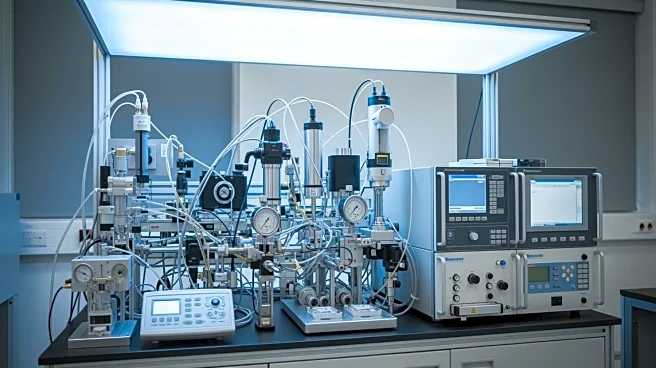What's Happening?
Stream Measurement has unveiled a new digital gas calibration rig, valued at £300,000, which significantly enhances testing capacity and creates new job opportunities. This development marks a major step
into the digital age for the company, securing the future of one of the UK's most advanced flow measurement facilities. The rig is expected to double the testing capacity, providing more efficient and accurate calibration services. This initiative is supported by Made Smarter, a program aimed at promoting digital transformation in manufacturing. The launch of the rig is part of Stream Measurement's broader strategy to integrate digital technologies into its operations, ensuring long-term growth and competitiveness in the industry.
Why It's Important?
The introduction of the digital gas calibration rig is a significant advancement for Stream Measurement and the broader manufacturing sector. By enhancing testing capacity and accuracy, the company can better serve its clients, leading to improved product quality and reliability. This development also highlights the importance of digital transformation in manufacturing, as companies seek to leverage technology to boost efficiency and competitiveness. The creation of new jobs is a positive outcome, contributing to economic growth and workforce development. As more companies adopt digital technologies, the manufacturing industry is likely to see increased innovation and productivity, benefiting both domestic and international markets.
What's Next?
Stream Measurement is expected to continue its digital transformation efforts, exploring additional opportunities to integrate technology into its operations. The success of the gas calibration rig may prompt other companies in the manufacturing sector to invest in similar initiatives, driving further innovation and growth. Collaboration with programs like Made Smarter will be crucial in supporting these efforts, providing resources and guidance for companies navigating the digital landscape. As the industry evolves, regulatory bodies may need to update standards and practices to accommodate new technologies, ensuring safety and compliance.
Beyond the Headlines
The shift towards digital technologies in manufacturing raises important ethical and cultural considerations, particularly regarding data privacy and security. As companies collect and analyze more data, concerns about how this information is used and protected may arise. Additionally, the integration of digital technologies could impact employment patterns, requiring new skills and expertise in the workforce. The manufacturing sector may need to invest in training and education programs to prepare workers for the digital age, ensuring a smooth transition and minimizing disruption.











